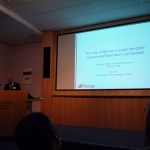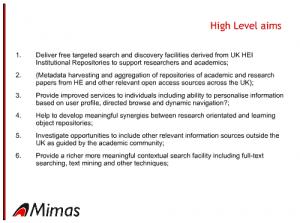UK Institutional Repository Search: a collaborative project to showcase UK research output through advanced discovery and retrieval facilities: The Session Blog
July 9th 2009 at 10am
Presenters: Sophia Jones and Vic Lyte (apologies for absence – please email any comments and queries)
Background
 (Source)
(Source)
Sophia Jones, SHERPA, European Development Officer, University of Nottingham.
sophia.jones@nottingham.ac.uk 44 (0)115 84 67235
Sophia Jones joined the SHERPA team as European Development Officer for the DRIVER project at the end of November 2006. Since December 2007, she has also been working on the JISC funded Intute Repository Search project.
Jones has a BA in Public Administration and Management (Kent), an MA in Organisation Studies (Warwick) a Certificate in Humanities (Open University) and is currently studying part time for a BA in History (Open University). She is also fluent in Greek. Prior to joining the University of Nottingham, Jones worked as International Student Advisor at the University of Warwick, Nottingham Trent University and the University of Leicester.
Sophia’s interests include international travel, music, cinema and enjoys spending time reading the news of the day.
 (Source)
(Source)
Vic Lyte MIMAS, Director of INTUTE, University of Manchester
Mimas, University of Manchester, +44 (0)161 275 8330 vic.lyte@manchester.ac.uk
Vic Lyte is the Director of the Institute Repository Search Project. Lyte is also Development Manager at Mimas and also Technical Services Manager at Mimas National Data Centre. Lyte’s specialty areas are design and development of Autonomy IDOL technology within Academic & Research vertical and advanced search and discovery systems, architectures and interfaces with research and teaching context. Lyte’s work is lead by repository and search technologies.
Session Overview
The UK Istitutional Repository Search (IRS) was initiated after a perceived gap was noticed in the knowledge access search process, where there appeared to be unconnected islands in knowledge materials. The IRS followed on from the intute research project. The high end aims included easier access for researchers to move from discovery to innovation by linking repositories to exchange knowledge materials. The IRS uses two main search methods: a conceptual search and a text-mining search. A question was asked by a member of the audience to differentiate the searches. Jones responded by stating that the conceptual search searches documents, whilst the text-mining search searches within documents.
Jonesa then demonstrated the two types of searches by using an example quesry of ethical research. Searches can be added by suggested related terms, or narrowed down by filtering through repository or document type. The conceptual search results can also be viewed as a 3D interactive visualisation. The text-mining search can also be viewed as an interactive cluster map.
In summary Jones stated that IRS had met all its high end aims. In engaging in a focus group with the research community there was encouraging support. The only suggested improvement was a personalisation aspect, which the IRS would have the potential to add, with a projected roll out in the next phase of IRS.
 (Source)
(Source)
Questions and comments
1. How is the indexing managed? Answer: Please email Vic Lyte.
2. Does IRS have data-mining tools in the set? Answer: Yes, this was developed by NaCTeM.
3. How much does IRS cost? Please email Vic Lyte.
4. Is IRS available now? Yes, there is free access. However at this stage IRS is more of a tool than a service.
5. Comment from Fred Friend (JISC): I’m from the UK. If this is valuable, we’ll have to fight to protect these systems because of budget cuts and the publishers fighting. So, to keep it’s value, we’ll have to convince government about it.
References